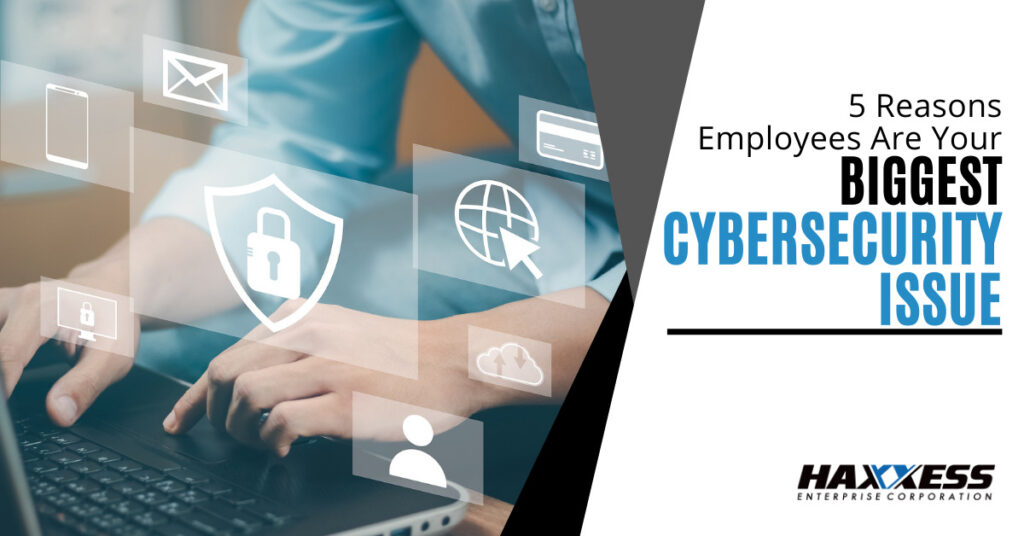
Cybersecurity is a priority no matter what country you call home. Hackers know no geographical boundaries.
The tremendous increase in cyberattacks affects both individuals and businesses alike. People receive emails from strangers, click open the links attached to them and end up accidentally causing a major data breach.
You’re familiar with these actions as it is not uncommon. However, when this happens, it poses a significant threat to your organization. In this technology age, IT security is vital for the success of any business. Email filtering and firewalls are some of the cybersecurity measures that most organizations enforce. Others can include DNS filtering, endpoint device monitoring, and rules-based identity management.
Ironically, all these cybersecurity measures can be ineffective if you ignore your most significant security threat – Employees.
Your employees are great individuals. Most will not intentionally bring any harm to your organization. But, sometimes, they make IT completely preventable security mistakes and that can cause a major meltdown for your business.
Here are some of the reasons employees are your most significant security risks.
Many employees are unaware of cyber criminals’ various tactics to carry out phishing attacks. According to a report, 51% of Canadian employees are not concerned about cyberattacks and how it affects their organization.
This ignorance remains one of the many reasons your employees will click on links attached to business emails and end up on phishing sites. As a result, the organization becomes vulnerable to all forms of attacks.
Your employees are ignorant of cybersecurity measures because you do not conduct regular training. Nearly 40% of the working population in Canada maintain that their employers do not provide cybersecurity training for them. Without this training, your employees will remain one of your biggest risks regardless of the sophisticated software you use.
The internet is used widely for all types of business activities, including accessing cloud accounts and researching information. Considering the significance of the internet, it is no surprise that browsing online can be dangerous.
There are lots of features that can protect your employees from unsavory websites. But, this does not cause the risks to disappear completely. Fortunately, you can encourage good network security to prevent your employees from accessing malicious websites.
Web filtering is a good way of protecting your network and promoting productivity among your workforce.
Social engineering is another way cybercriminals trick your employees into providing confidential information. These criminals manipulate your employees into believing that it is a genuine request.
This is common with the reply chain phishing, where the vector actor uses the email of a legitimate participant to send out malicious links. The criminal can rely on this strategy and pretend to be offering assistance to the victim while s/he carries out the deed.
The Canadian Bankers Association (CBA) describes three techniques of social engineering that these criminals use. These include fear, urgent requests, and an offer of an opportunity.
Social engineering techniques are often successful because there is now so much information online on social media sites like LinkedIn, Facebook, and Instagram that attackers can make their phishing very convincing.
Several organizations use Microsoft Office, project management tools, and emails to carry out their daily operational activities.
Password management is not an inbuilt phenomenon. Your employees must be taught the right way to use a password. This should include creating a strong password and the need to change passwords often.
It would help if you made password protection one of your company’s policies. This way, your employees will understand its importance and adhere to every instruction you put in place. Implementing multi-factor authentication and using a business password manager can also help prevent credential theft.
How your employees print and keep documents will expose you to many cybersecurity risks.
A lot of companies make use of wireless printers without properly protecting them from being hacked. Printers are vulnerable to various cyberattacks if they’re connected to your network, and this is especially true when they are not updated with the most recent security patches.
In addition, data theft is straightforward with the use of printers. Thus, cybercriminals can get a hold of sensitive information in this way.
Employees must be taught how to protect the information using cloud computing and what’s involved in protecting sensitive and protected information that may be covered by one or more data privacy regulations.
Security software is an integral part of your IT security services. However, without the appropriate human effort, your company is still at risk.
This is why you must ensure that your employees have the relevant tools to help them stay productive while protecting your company from the activities of cybercriminals.
If you need assistance enforcing cybersecurity measures in your Sudbury, North Bay, and Northern Ontario business, contact Haxxess and get professional services. Call (705) 222 8324.